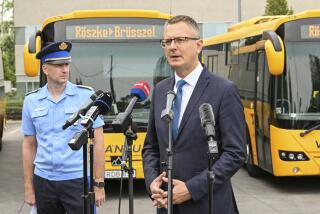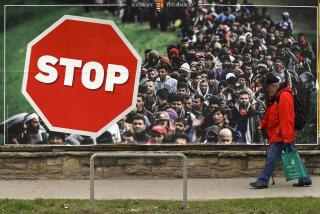From the archives: Bush Discloses 7-Point Aid Plan for Hungary
BUDAPEST, Hungary -- In a striking example of how communism is crumbling in Eastern Europe, President Bush went before an enthusiastic audience at Karl Marx University of Economics here Wednesday and outlined a seven-point program to aid Hungary in its efforts to develop free enterprise and a more open political system.
The program, modest in terms of financial assistance and similar to one he announced in Warsaw on Monday to aid Poland in its economic and political reforms, includes a proposal for a $25-million grant to help Hungary expand its private sector, already one of the largest in Eastern Europe.
The program also includes proposals that would ease trade restrictions when Hungary passes a new law freeing up emigration and that would declare Hungary a beneficiary country under the U.S. Generalized System of Preferences program, which allows 4,100 products from such countries to enter the U.S. duty-free.
In addition, the program would fund a $5-million international environmental center in Budapest, expand various exchange programs, conclude a science and technology agreement and provide Peace Corps volunteers to instruct Hungarians in the teaching of English, the first Peace Corps workers to be sent to a European country.
At Karl Marx University, Hungaryâs premier economics school where many of the nationâs political elite have studied, the Presidentâs speech was interrupted 14 times by applause. He was given a sustained standing ovation when he finished.
Extolling the virtues of capitalism and taking a critical look at Karl Marx, Bush said that if Hungarians did not find it ironic that he was speaking at a university named for Marx, âtry it on for size in the United States.â
âRegarded Man as Helplessâ
âSome historians argue that Marxism arose out of a humane impulse,â Bush declared. âBut Karl Marx traced only one thread of human existence and missed the rest of the tapestry--the colorful and varied tapestry of humanity. He regarded man as helpless--unable to shape his environment or destiny.â
But, said Bush, âMan is not driven by impersonal economic forces. He is not simply an object acted upon by mechanical laws of history. Rather, man is imaginative and inventive. . . . Man is dynamic, determined to shape his own future.â
Speaking from a greenery-lined podium with huge American and Hungarian flags as a backdrop, Bush declared:
âYour challenge is enormous and historic: to build a structure of political change and decentralized economic enterprise on the ruins of a failed Stalinist system.â
After spending three days in Poland and two in Hungary promoting the reform movements, Bush leaves Budapest today for Paris, where he will attend an economic summit meeting with the leaders of the other six largest industrialized democratic nations: Britain, Canada, France, Italy, West Germany and Japan.
Part of Bushâs aid package includes a pledge to urge his summit partners to join in a coordinated effort with the United States in support of Hungaryâs reforms. U.S. officials said this would be a major topic in Paris.
In his speech, Bush noted that for the first time, the Iron Curtain that has divided Europe since shortly after World War II âhas begun to part,â with the barbed wire that separated Hungary and Austria being torn down.
Later Wednesday, in a meeting with Hungarian officials, Premier Miklos Nemeth presented Bush and Secretary of State James A. Baker III with identical plaques that symbolize the dismantling of the barrier. On each plaque was mounted a snippet of barbed wire. In accepting his plaque, Bush beamed and read the inscription aloud:
âThis piece of barbed wire was part of the Iron Curtain alongside the Hungarian-Austrian border. It represented the division of the European continent in two halves. Its dismantling was made possible by the will of the Hungarian people in recognition of peaceful coexistence and mutual interdependence. It is still believed that the artificial physical and spiritual walls still existing in the world someday will collapse.â
Bush, noting that the plaque had been assembled by an army sergeant, called it âa marvelous symbolâ of his visit to Eastern Europe.
Meeting with Hungarian officials later at the residence of U.S. Ambassador Mark Palmer, Bush was assured that there will no turning back for Hungary as it moves toward a system fostering free enterprise and freer elections.
State Minister Imre Pozsgay told reporters he had assured the President that the reforms are âirreversible.â And if the ruling Socialist Workers Party loses the election that is expected to be held early next year, the party will abide by the results and give up power, he said he told Bush.
Pozsgay also said that Hungarian officials are âentirely satisfiedâ with the aid package announced by Bush. White House officials said the Hungarian-American Enterprise Fund that would be set up under a $25-million grant would be administered by a board of directors composed of prominent Hungarians and Americans with experience in business and government. The board would write the rules for operating the fund.
Asked why Poland was being granted $100 million for a similar fund, White House Chief of Staff John H. Sununu pointed out that Polandâs population of about 37.5 million is much larger than Hungaryâs 10.6 million and that Hungary is much further advanced in creating private enterprise.
As part of the aid package, Bush announced that as soon as Hungary passes its pending emigration law, he will grant the country most-favored-nation trading status--without the requirement under the Jackson-Vanik Amendment that Hungary must receive an annual waiver to qualify.
Hungaryâs Council of Ministers has approved the final draft of a new emigration law. If Parliament passes the law as expected, Hungary will become the first Warsaw Pact country to have legalized and implemented free emigration, thus satisfying the requirements of Jackson-Vanik.
Environmental Center
The $5-million environmental center proposed for Budapest would provide a facility for cooperative research and activities involving government and non-government experts and public interest groups from the United States and Europe concerned with the environment, including energy and nuclear safety.
The science and technology agreement with Hungary envisioned by Bush includes a broad program of cooperation in such areas as basic sciences, the environment, agriculture, medicine, energy, geology and nuclear safety.
In Washington, according to the Associated Press, Peace Corps Director Paul D. Coverdell said that about 60 American volunteers could be in Hungary by next year to train Hungarians to teach English.
âThis is a historic day and the threshold of a new era for the United States Peace Corps,â he told a news conference. Hungary will be the 100th nation to be served by the corps and âwill also be the first European and first Eastern Bloc nation in which the Peace Corps has served,â he said.
A formal agreement still needs to be worked out with Hungarian officials, and an assessment team will determine the size and scope of the initial program, Coverdell said. The first volunteers may arrive in Hungary by late fall for training before being assigned to teaching positions early next year.
The emphasis will be on training Hungarian teachers to teach English as a second language. Russian-language training is no longer required in Hungarian schools, and Hungarian officials have expressed interest in expanding the use of English.
Bush, in announcing the Peace Corps component of his aid program, said that having more English speakers will help âopen the global market to more Hungarians.â
NEW-FOUND FREEDOM: Reforms have unlocked Hungaryâs opposition. Page 16
RELATED STORIES: Pages 16 and 17
BUSHâS SCHEDULE
7:45 a.m. today--Attends American community greeting at U.S. ambassadorâs residence in Budapest.
8:50 a.m.--Leaves for Paris.
Noon--Arrives at Palais du Trocadero via Orly Airport, for bicentennial ceremony.
1:10 p.m.--Attends bicentennial luncheon at presidential palace hosted by President Francois Mitterrand.
4 p.m.--Returns to palace for meeting with Mitterrand.
6:55 p.m.--Attends opening of Bastille Opera.
9 p.m.--Attends dinner at Musee dâOrsay hosted by Mitterrand.
More to Read
Sign up for Essential California
The most important California stories and recommendations in your inbox every morning.
You may occasionally receive promotional content from the Los Angeles Times.










